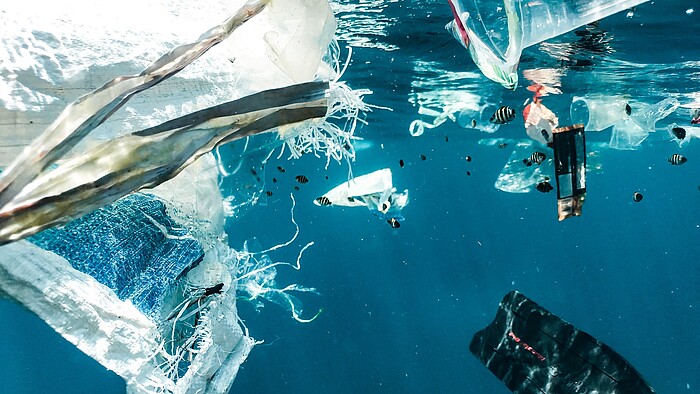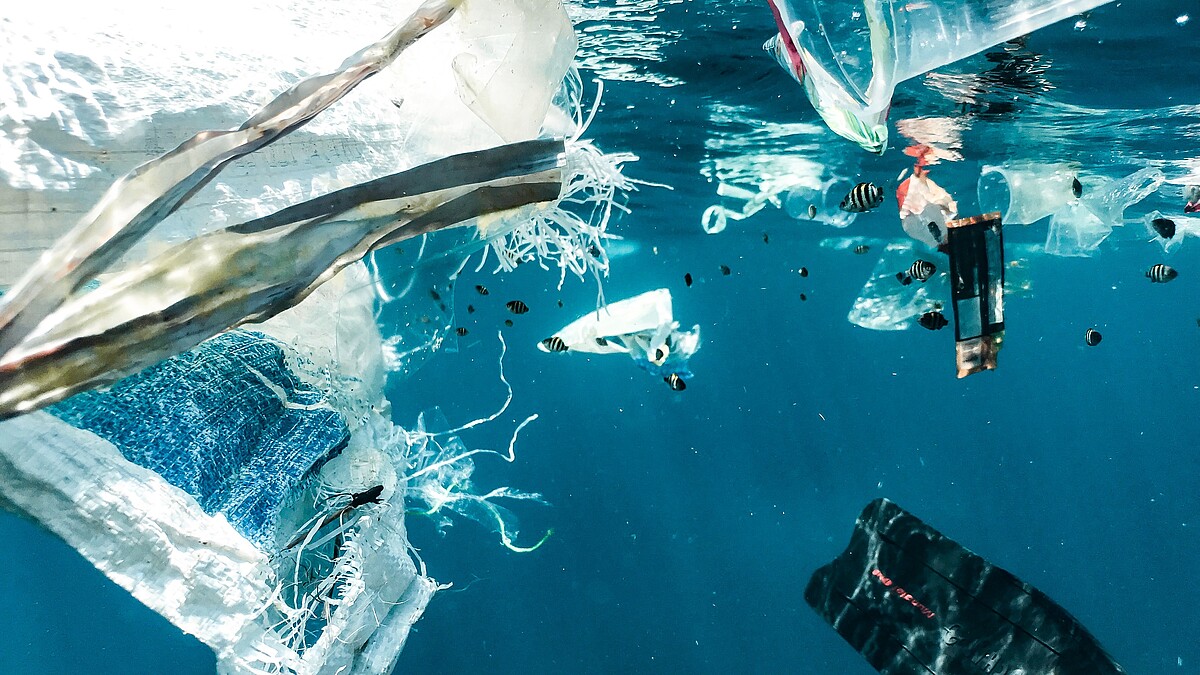SkalAb: Multi-scale analysis of aquatic degradation mechanisms of polymeric materials

| Year: | 2021 |
| Funding: | EFRE, REACT-EU |
| Duration: | 12/2021 to 06/2023 |
| Is Finished: | yes |
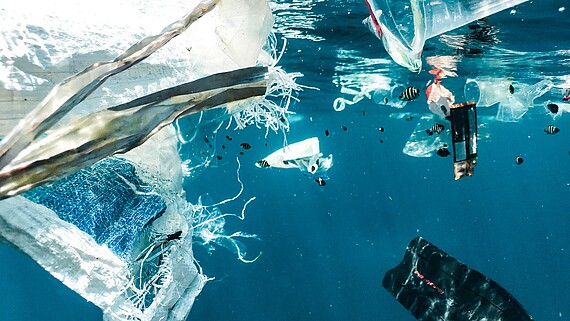 ©
Naja Bertolt Jensen
©
Naja Bertolt Jensen
IKK has received more than 2 million euros of investment funding through the "European Regional Development Fund (ERDF) financed as part of the Union's response to the COVID-19 pandemic" and with participation from the state of Lower Saxony for the project with the acronym "SkalAb" (Multi-scale Analysis of Aquatic Degradation Mechanisms of Polymeric Materials).
Behind the project is the establishment of an extensive infrastructure for the examination of a multitude of open questions on the degradation behavior of polymeric materials in water, which IKK is currently investigating and will continue to do so in the future.
With the ERDF funding, IKK has established a multi-scale, flexible testing laboratory consisting of, among others, various micro- and mesocosms, which enable the synthesis and control of environmental conditions of natural aquatic habitats (e.g. rivers, lakes and oceans) for systematic degradation experiments. This research infrastructure can be used to specifically determine biological, chemical, and mechanical aquatic degradation behavior with realistic superposition of the various material and environmental influencing variables. In addition, the temporal influence, the degradation kinetics as well as the interrelationships between material and environmental parameters including the associated degradation mechanisms and the accompanying water analysis with regard to possible degradation products can be systematically investigated, so that it becomes possible to predict half-lives for materials or components as a function of the various influencing parameters and to specifically develop less environmentally harmful materials for certain applications.
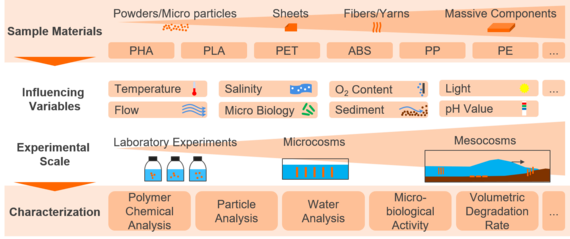 ©
Bittner | IKK
©
Bittner | IKK
Implementation
Specifically, the infrastructure described below was set up as part of the SkalAb project:
Sample preparation
With the help of sample preparation, plastic samples can be specifically produced or processed in predefined material compositions, morphologies/geometries (e.g. microplastics, filaments, granulates, sheets, test specimens), crystallinities and pre-weathering stages.
This includes
- Grinding using a cryogenic mill
- Fractionation using a sieve shaker
- Sample cutting via water jet cutting
 ©
Bittner | IKK
©
Bittner | IKK
Biodegradability
The basic prerequisite for the final degradation of plastics is their biodegradability by microorganisms. The following systems are available to determine this biodegradability under different environmental conditions:
- Closed respirometric measuring system OxiTop (120 measuring stations in total)
- Open respirometric measuring system Echo Respirometer
- 36 measuring stations
- CO2, O2 and CH4 sensors
- Analysis in aqueous matrix and soil matrix
 ©
Bittner | IKK
©
Bittner | IKK
Freshwater and saltwater microcosms
The microcosms are utilized to simulate various environmental conditions. They can be used to investigate the influence of various abiotic parameters such as temperature, UV radiation, salt content, etc. on the degradation behavior of plastic samples. Two types of microcosm systems were set up:
- Microcosm surf zone
- 1 L aquaria (40 units)
- Tribological load through generation of waves
- Temperature control
- UV irradiation
- Investigation of particles, fibers, filaments etc.
 ©
Bittner | IKK
©
Bittner | IKK
- Microcosm water column / sediment
- 200 L aquariums (120 units)
- Temperature control
- UV irradiation
- Investigation of test specimens (bulk materials)
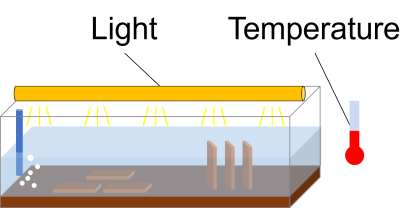 ©
Bittner | IKK
©
Bittner | IKK
Freshwater and saltwater mesocosms
In order to simulate specific environmental scenarios and to be able to examine macroscopic samples, different mesocosms were developed as part of the multi-scale concept:
- Wave flumes
- 6 basins, each 6 m long, volume approx. 6,000 L
- Wave generators to simulate various tribological loads
- Temperature control
- UV irradiation
- Examination of test specimens (bulk materials)
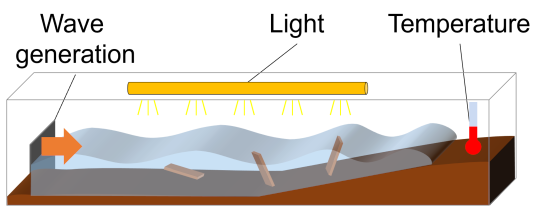 ©
Bittner | IKK
©
Bittner | IKK
- Tidal range mesocosms
- 6 basins, each 2 m in diameter, volume approx. 1,900 L
- Simulation of high and low tide
- Temperature control
- UV radiation
 ©
Bittner | IKK
©
Bittner | IKK
Analytical methods
A comprehensive description of the degradation behavior of plastics requires suitable analytical methods that can detect the changes in the samples at different levels (morphological, polymer-chemical). The following methods have been established for this purpose:
- Filtration systems for sample collection
- Polymer chemical analysis
- Particle analysis
- Water analysis
- Chemical oxygen demand (COD)
- Total organic carbon (TOC)
 ©
Bittner | IKK
©
Bittner | IKK
General project objective
The realization of this project contributes to the achievement of the goals of the Green Deal and the Europe 2020 strategy, which are to promote a resource-efficient, modern, greener and more competitive economy.
Projects at IKK on the degradation behavior of plastics
Several research projects on the topic of aquatic degradability are currently underway at IKK. These will benefit from SkalAb's advanced experimental setups and analytical methods and thus generate new as well as close-to-reality results.
This includes the projects:
Support
The following partners supported the implementation of the SkalAb project with their technical expertise:
- HYDRA Marine Sciences GmbH
- Ludwig Franzius Institute of Hydraulic, Estuarine and Coastal Engineering (LuFI) at Leibniz Universität Hannover
- Private Hochschule für Wirtschaft und Technik Vechta/Diepholz (PHWT)
Contact person
Dr. Florian Bittner
bittner@ikk.uni-hannover.de
+49 511 762 13301


